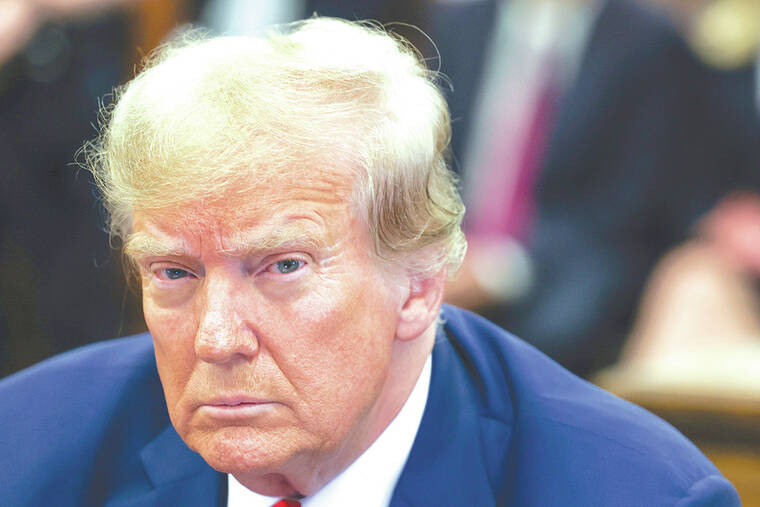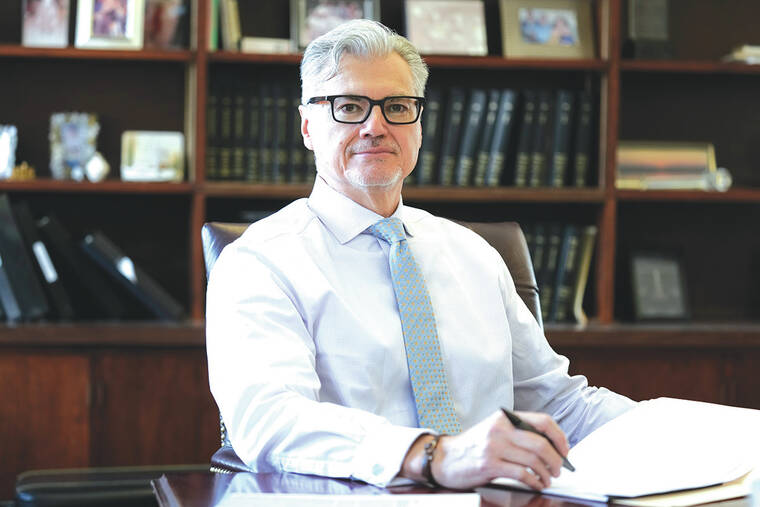NEW YORK — A New York appeals court judge on Monday rejected Donald Trump’s bid to delay his April 15 hush money criminal trial while he mounts a last-minute fight to move the case out of Manhattan, foiling the former president’s latest attempt to put off the historic trial.
Justice Lizbeth González of the state’s mid-level appeals court ruled after an emergency hearing Monday where Trump’s lawyers asked that she postpone the trial indefinitely while they seek a change of venue.
They contended the presumptive Republican nominee faces “real potential prejudice” in heavily Democratic Manhattan and said the jury pool has been polluted by news coverage of Trump’s other recent cases, including his $454 million civil fraud judgment and the $83.3 million he’s been ordered to pay for defaming writer E. Jean Carroll. He is appealing both verdicts.
“Jury selection cannot proceed in a fair manner,” Trump lawyer Emil Bove argued, citing the defense’s polling and a review of media coverage.
Trump’s hush money trial is the first of his four criminal indictments slated to go to trial and would be the first criminal trial ever of a former president.
In a separate appellate matter, Trump’s lawyers are challenging a gag order barring him from making comments about jurors, witnesses and others connected to the case. The trial judge, Juan M. Merchan, recently expanded the gag order after Trump lashed out at his daughter, a Democratic political consultant, on social media. The appeals court will hear that matter Tuesday.
Trump, who lived in Manhattan for decades and rose to fame as a real estate developer shaping its iconic skyline, has suggested the trial should be moved to Staten Island, the only New York City borough he won in 2016 and 2020.
Steven Wu, the appellate chief for the Manhattan district attorney’s office, noted that Merchan, had already rejected Trump’s requests to move or delay the trial as untimely.
“The question in this case is not whether a random poll of New Yorkers from whatever neighborhood are able to be impartial, it’s about whether a trial court is able to select a jury of 12 impartial jurors,” Wu said.
He blamed Trump for stoking pretrial publicity with “countless media appearances talking about the facts of this case, the witnesses, and so on.”
As the appeals court fight was playing out, Merchan released his plan Monday for conducting jury selection, including what jurors will and won’t be asked about their views on Trump.
In a letter to both sides, Merchan declared that choosing jurors isn’t about whether they like or don’t like anyone in the case but whether prospective jurors can assure they will “set aside any personal feelings or biases and render a decision that is based on the evidence and the law.”
Paperwork relating to Trump’s appeals was placed under seal and not publicly available.
Trump had pledged to appeal after Merchan ruled last month that the trial would begin April 15. His lawyers had pleaded to delay the trial at least until summer to give them more time to review late-arriving evidence from a prior federal investigation into the matter. Merchan, who had already moved the trial from its original March 25 start date, said no further delays were warranted.
Trump’s lawyers filed their appeals Monday on two separate court dockets. One was styled as a lawsuit against Merchan, a legal mechanism allowing them to challenge his rulings.
In New York, judges can be sued over some judicial decisions under a state law known as Article 78. Trump has used the tactic before, including against the judge in his civil fraud case in an unsuccessful last-minute bid to delay that case last fall.
In the hush-money criminal case, he is accused of falsifying his company’s records to hide the nature of payments to his former lawyer and fixer Michael Cohen, who helped him bury negative stories during his 2016 campaign. Cohen’s activities included paying porn actor Stormy Daniels $130,000 to suppress her claims of an extramarital sexual encounter with Trump years earlier.
Trump pleaded not guilty last year to 34 felony counts of falsifying business records. He has denied having a sexual encounter with Daniels. His lawyers argue the payments to Cohen were legitimate legal expenses.
As Trump’s lawyers stressed Monday that he was facing an unprecedented level of damaging publicity in Manhattan, they also referenced a decision issued by the state’s appellate court more than 25 years ago.
In that case, the court agreed to move the trial of four New York City police officers charged with killing Amadou Diallo, an unarmed Guinean student, in the Bronx. Citing the “public clamor” in the city, the court agreed to move the trial to Albany, where the officers were ultimately acquitted.


